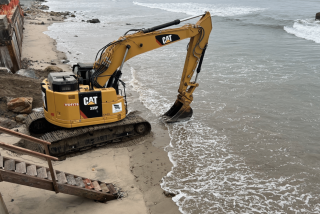Former Councilman Facing Charges of Polluting Wetlands
- Share via
A former Huntington Beach councilman who campaigned against development of fragile Bolsa Chica was in court Tuesday on charges that he polluted nearly 14 acres of wetlands there.
John A. Thomas, who served on the council from 1978 to 1986, faces 33 felony counts of dumping into national waters, one felony count of dumping oil and a misdemeanor count of altering a stream bed.
“The damage is extensive,” said Capt. Steve Edinger of the state Department of Fish and Game. “In fact, we brought in the [U.S. Environmental Protection Agency’s] national wetlands expert, who said this was the worst wetlands violation he had ever seen.”
Thomas’ arraignment at the Orange County West Justice Center in Westminster was delayed until Aug. 1. If convicted, he could be sentenced to five years in prison and fined $50,000 for every day of violations.
Thomas did not return calls for comment. His attorney, Julian W. Bailey, did not dispute many of the assertions but said his client had done nothing illegal and was willing to spend millions on cleanup.
“I agree with a lot of the facts. I disagree that any crime has been committed,” Bailey said.
Thomas, 60, of Huntington Beach owns about 50 oil-well leases on the northeast corner of the Bolsa Chica wetlands. The land is owned by Hearthside Homes, would-be developer of the Bolsa Chica mesa. Decades-old access roads carve up the property, creating irregularly shaped wetland patches.
In an unsuccessful bid for county supervisor in 1994, Thomas campaigned against residential development on the Bolsa Chica wetlands. Hearthside Homes’ plans to build there were stopped in court.
He is accused of dumping 38,000 cubic yards of wood chips and dirt onto 13.5 acres there between 1996 and 1998 and releasing an unspecified amount of oil that pooled on 0.1 acre in 1998, said deputy district attorney Scott Zidbeck.
“It basically destroyed ecosystems,” Zidbeck said. “The plants died, the water dried up.”
Another 19 misdemeanor charges are pending against Thomas for an oil spill at another location that killed more than 100 birds.
Responding to the latest charges, Thomas’ attorney said that most of the dirt was dumped in upland areas. Bailey said some dirt was pushed into the wetlands by heavy equipment being used to upgrade oil rigs to make them less likely to seep during rain. Workers also put wood chips into the wetlands, believing that it would be beneficial, he said.
“They thought it was a good idea. It turned out to be a bad idea,” he said.
However, Bailey said, these lapses ought to be excused because Thomas is willing to clean up all damage. His oil leases also require the land to be restored to its natural state, something that Bailey anticipates will cost at least $5 million in the future.
He said the district attorney’s office has been unwilling to settle on such mitigation work, because it wants to make an example of Thomas.
Zidbeck said the egregiousness of the case and dwindling wetlands make criminal charges imperative.
Coastal wetlands are a special habitat for plants such as coastal live oak, beach evening primrose, sea lavender, eel grass and a variety of sages. They act as filters for urban runoff. Over 95% of the state’s coastal wetlands have been destroyed.
The Bolsa Chica wetlands, the largest such refuge in southern California, also provide an important stopover for migratory birds on the Pacific Flyway. While officials said the Thomas case was the worst they remembered because of the amount of dirt dumped on such rare coastal wetlands, larger wetlands have been destroyed.
In 1996, hundreds of acres of vernal pools in northern California’s Tehama County were destroyed by a timber company. They were fined $30,000 and agreed to protect wetlands in California and Oregon.
In 1994, 23 acres of Ventura County wetland linking the Santa Monica Mountains with a key creek was destroyed by farmers.
(BEGIN TEXT OF INFOBOX / INFOGRAPHIC)
Pollution Charges
A former Huntington Beach city councilman stands accused of dumping 38,000 cubic yards of wood chips and dirt on the northeast corner of the Bolsa Chica wetlands where he owns the oil leases for about 50 wells.
Source: Orange County District Attorney’s Office
More to Read
Sign up for Essential California
The most important California stories and recommendations in your inbox every morning.
You may occasionally receive promotional content from the Los Angeles Times.










